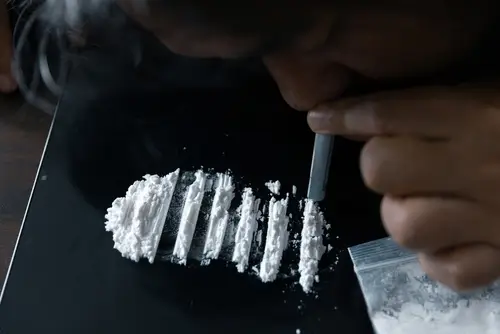If you have ADHD, cocaine can make you feel like you’re on top of the world. The simulating effects provide a rush of euphoria and confidence, quieting your wandering mind and restlessness. For once, you feel focused and in control.
Repeated cocaine use changes the brain, damaging the dopamine system and other areas involved in motivation, pleasure, and impulse control. This can worsen symptoms of inattention and hyperactivity and make ADHD medications less effective.
The allure of cocaine for managing ADHD symptoms is an illusion, often ending in addiction and a lifetime of struggle. In this article, we will discuss how cocaine and ADHD interact with each other, what cocaine feels likes with ADHD, how cocaine affects the brain, and the risks involved with taking cocaine with ADHD.

How Does Cocaine & ADHD Work?
For those with ADHD, cocaine works differently in the brain. Cocaine is a stimulant that increases dopamine levels, a neurotransmitter necessary for pleasure, motivation, and learning. Since people with ADHD often have lower dopamine levels, cocaine may have a calming and focusing effect.
Cocaine prevents dopamine, norepinephrine, and serotonin from being reabsorbed back into the brain. As ADHD may cause a deficiency in these chemicals, having these chemicals remain active within the brain leads to calming effects. For people with ADHD, the effects can help improve concentration and task completion, reduce restlessness and impulsiveness, and enhance a sense of reward and motivation.
The euphoric high from cocaine, which individuals without ADHD experience, is caused by a flood of dopamine in the brain’s reward center. For those with ADHD, this dopamine rush can make them feel calm, focused, and in control. The burst of dopamine, adrenaline, and serotonin creates a temporary sense of confidence and motivation that may seem to alleviate ADHD symptoms.
However, these effects are short-lived and often followed by a “crash,” leading to irritability, restlessness, and inattention. Repeated use can also lead to addiction, as people chase the initial high and temporary relief from their symptoms. Cocaine is an illegal and dangerous drug that should not be used to self-medicate or manage ADHD.
Learn More: What Does Meth Do to Someone Who Has ADHD?
What Does Cocaine Feel Like With ADHD?
For those with ADHD, cocaine can have a paradoxical calming effect. Rather than the typical energetic rush, cocaine may help you focus and feel less distracted.
Cocaine increases dopamine in the brain, similar to how ADHD medications work. But while prescription drugs are carefully formulated to target symptoms, cocaine creates a massive surge that floods your system. This can temporarily alleviate feelings of restlessness or inability to focus that come with ADHD. These feelings may include:
- You may feel more in control of your thoughts and can concentrate on one thing at a time.
- Racing thoughts may slow down, allowing you to feel less overwhelmed.
- Impulsiveness and hyperactivity tend to decrease, creating a sense of calm.
However, these effects are short-lived and come with dangerous risks. Cocaine is highly addictive, and continued use can lead to erratic behavior, psychosis, seizures, heart attack, and even death.
Rather than self-medicating with such a destructive substance, speak to your doctor about safe and effective treatment options for managing your ADHD symptoms. Prescription stimulants, therapy, and lifestyle changes are all healthier choices that can help you find balance and focus.

What Structures of The Brain Does Cocaine Affect?
When cocaine enters your brain, it affects several areas of reward, memory, self-control, and decision-making. Understanding how these areas of the brain can be affected by cocaine use is essential in being aware of the consequences of drug use.
Reward System
The most significant area affected by cocaine use is the brain’s reward system. Cocaine floods the nucleus accumbens and ventral pallidum with dopamine, the “feel-good” chemical in your brain. As this area is flooded with dopamine, it creates intense feelings of pleasure associated with cocaine. This can alter how you experience pleasure and reward, resulting in individuals repeatedly seeking the drug to experience a euphoric high.
Memory And Cognition
The amygdala and hippocampus, responsible for emotional and working memory, are hampered by cocaine use. As the body takes in the cocaine, it disrupts the regular communication between neurons in the hippocampus, damaging memory formulation. This impairs your ability to learn from experience and make sound judgments.
Volition And Self-Control
The orbitofrontal and subcallosal cortices help regulate willpower and motivation. This impacts decision-making, resulting in repeated drug use and addiction. As cocaine disrupts signals in these areas, making it harder to stop cravings and resist the urge to use again.
Executive Function
The prefrontal cortex and cingulate gyrus are essential for controlling impulses, making decisions, and adapting to change. Cocaine use weakens connections in these regions, damaging your ability to stay focused, manage emotions, and plan. Even if cocaine users stop taking the drug, cocaine affects the brain’s neuroplasticity, causing it to rewire itself. This can lead to long-term effects on the brain’s function and make it increasingly difficult for individuals to recover from cocaine addiction.
Continue Reading: ADHD in Adults: Recognizing Symptoms & Seeking Treatment
Does ADHD Increase the Susceptibility of Cocaine Use?
If you have ADHD, you may be especially vulnerable to the effects of cocaine. Studies show people with ADHD are more likely to develop cocaine use disorder, possibly because the drug impacts their brain chemistry differently.
A study conducted by the University of Torino in 2021 indicated that over 1 in 4 adults with ADHD have used cocaine, and 1 in 10 develop an addiction. The risk seems highest for those whose ADHD symptoms are untreated or undertreated. If you have ADHD and use cocaine, you’re more prone to binging and having trouble stopping, even if you want to.

What are the Risks Involved?
Cocaine use comes with serious risks, especially for those with ADHD. While the initial euphoric high may temporarily mask inattention or hyperactivity symptoms, the following crash can intensify them.
Repeated cocaine use rewires the brain’s reward circuit and pleasure centers. This makes the desire for cocaine increasingly compulsive and hard to resist. For people with ADHD who already struggle with impulse control, this can be particularly problematic and lead to addiction faster.
The health effects of long-term cocaine use are devastating. It can cause erratic mood changes, psychosis, and even trigger seizures or strokes. Cocaine can also cause damage to the heart and blood vessels. It causes high blood pressure, irregular heartbeat, and heart attacks in otherwise healthy young people. Significant weight loss is also common as cocaine reduces appetite.
Financially, cocaine addiction can ruin an individual’s bank account. As tolerance builds, the cost to sustain the same high becomes astronomical. Relationship and social problems are also frequent, as lying, stealing, and other manipulative behaviors emerge to hide use and obtain funds to buy more cocaine.
Read More: ADHD Tools To Resist Substance Abuse
Reach Out to Launch Centers Today to Manage ADHD & Substance Abuse
Cocaine may temporarily make you feel good, but the effects are fleeting, and the long-term consequences are devastating. Especially for those with ADHD, cocaine is not the answer you’re looking for and will likely worsen symptoms.
There are healthier ways to manage your ADHD that don’t endanger your life. Reach out to professionals at Launch Centers today to explore holistic and evidence-based treatment options. Our caring staff can help you develop skills and strategies to better cope with challenges sustainably. You don’t have to go through this alone.
Contact Launch Centers to speak with one of our qualified specialists and get started on your journey to wellness. We believe in you and will provide the support you need. There are always alternatives to cocaine, so reach out today.





